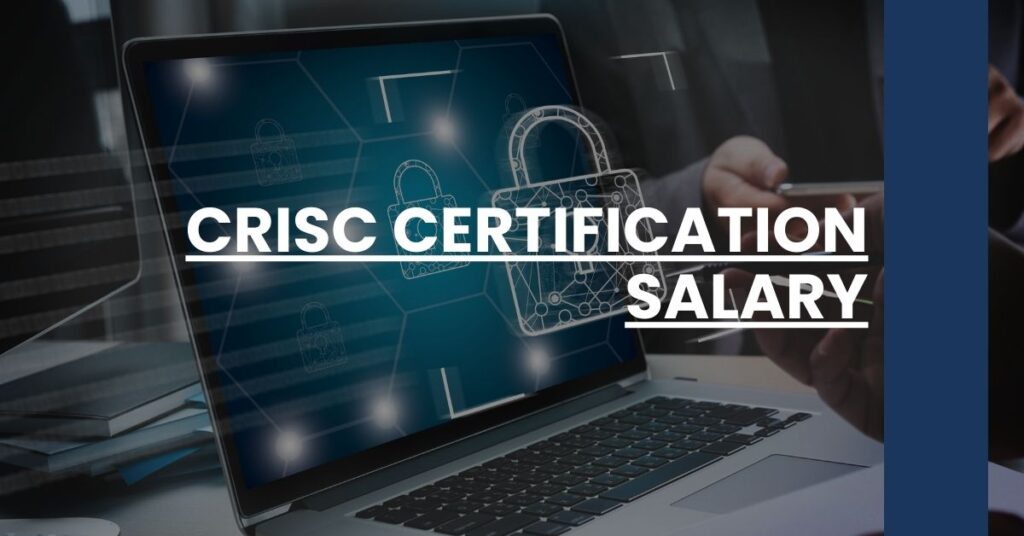CRISC certification can significantly elevate your earning potential in the field of risk management and information systems control. Professionals with CRISC credentials often command higher salaries, reflecting their verified expertise.
In terms of numbers:
- Entry-level CRISC holders: Fairly above average for IT salaries
- Experienced CRISC professionals: At the top tier of the IT pay scale
Reading on, you’ll learn how factors such as industry demand and job role influence these salary figures, and why a CRISC certification might just be your ticket to financial and career advancement.
- CRISC Certification Explained
- The Path to CRISC Certification
- Factors Influencing CRISC Certification Salary
- Average Salary for CRISC Professionals
- CRISC and Career Advancement
- Comparing CRISC to Other Cybersecurity Certifications
- Is CRISC Certification Worth It?
- Strategies to Maximize Salary with CRISC Certification
- Conclusion
CRISC Certification Explained
When you’re pursuing a career in risk management or information systems control, you might come across the term Certified in Risk and Information Systems Control or CRISC. This credential is not just a set of initials you add to your resume; it signifies a thorough knowledge of how to identify and manage IT risks effectively, and it is backed by ISACA, an international professional association focused on IT governance.
Since its inception, the CRISC certification has grown to become one of the most respected and sought-after qualifications for professionals looking to cement their expertise and credibility in the fields of risk and control. If you’re gunning for a role that demands the highest level of risk management skills, having a CRISC certification can be a game-changer for you. The certification encompasses four primary areas:
- Risk Identification
- Risk Assessment
- Risk Response and Mitigation
- Risk and Control Monitoring and Reporting
Through each of these areas, you will build a foundation that not only enriches your understanding but also equips you with the practical capabilities to navigate complex risk scenarios. These well-rounded skills are precisely why employers value CRISC certified professionals, and it’s a significant factor in the salary discussion we’re about to dive into.
The Path to CRISC Certification
If you’re considering the CRISC certification, the journey involves a few key steps. First, you need to satisfy the educational prerequisites. Although ISACA doesn’t dictate specific degrees, having a background in IT or business will certainly help.
Your next hurdle is work experience. You must demonstrate at least three years of experience in the field of information systems control and risk management. And within these three years, your performance should map directly to at least two of the four CRISC domains, with one of those years relating to domain one or two.
Then, there’s the examination: a rigorous 4-hour test comprising 150 multiple-choice questions. It’s designed to challenge your knowledge and ability to apply it in real-world scenarios. Passing this exam is a testament to your expertise and dedication.
Finally, maintaining your certification requires continuing professional education. You’re expected to earn a minimum of 20 CPE hours annually and 120 CPE hours every three years. This ensures your knowledge stays sharp and relevant as the industry evolves. Consider these steps your roadmap to becoming a risk management virtuoso, and with that recognition, comes the potential for a significant salary bump.
Factors Influencing CRISC Certification Salary
Several factors may sway your compensation once you earn your CRISC certification. Let’s examine the most influential ones:
- Experience: It’s simple—the longer you’ve navigated the risk management waters, the more valuable your experience is. Senior professionals with a CRISC tend to command higher salaries.
- Location: Where you work geographically can play a big role in your earnings. For example, cities with a booming tech industry often offer more competitive salaries to attract top talent.
- Industry Demand: The law of supply and demand applies here. Industries that are more vulnerable to IT risk—and thus have a greater need for qualified professionals—will typically pay more.
- Job Role: Not all IT roles are created equal in terms of pay. Higher-stakes positions involving substantial risk assessment and mitigation responsibility usually have higher associated salaries.
In a nutshell, your background, where you choose to plant your career flag, the prevailing market conditions, and the nature of your role will all influence your earning potential with a CRISC certification. You can gauge the competitive landscape and how your certification will work in your favor by looking at current job postings and salary surveys specifically for CRISC professionals.
Average Salary for CRISC Professionals
Now, let’s get down to figures. On average, professionals with a CRISC certification take home an impressive salary—often surpassing the six-figure mark. These numbers aren’t static, though; they reflect a range that varies widely depending on the factors we’ve discussed above.
Here are some insights you might find useful:
- Entry-Level CRISC Professionals: If you’ve recently acquired your certification and are new to the field, expect your salary to be on the lower end, but still competitive compared to non-certified peers.
- Mid-career Professionals: With several years of experience and a CRISC to your name, your earning potential can rise considerably.
- Executive Level: Those at the helm of major projects or departments with a CRISC certification can expect their salaries to reflect their high level of responsibility and expertise.
Considering these variations, it’s clear that there’s a strong financial incentive tied to earning and maintaining a CRISC certification. Whether you’re just starting out or are a seasoned veteran in the field, keeping your skills certified can make a significant difference in your paycheck. And if you’re curious about how your qualifications stack up in different parts of the world, take a look at global salary data that reveals the financial rewards of a CRISC certification.
CRISC and Career Advancement
When you add CRISC certification to your accolades, you’re not just boosting your professional credibility, but also setting yourself up for career advancement and job stability that many dream of. It’s a compelling way to demonstrate to employers that you’re equipped to handle the complex challenges of risk management and information systems control. This badge of honor can be a game-changer for your career trajectory.
With your CRISC certification, you open doors to leadership roles such as Chief Information Security Officer (CISO), IT Risk Manager, or a Compliance Program Manager. These leadership roles don’t just hold an esteemed spot in a company’s hierarchy; they are also synonymous with a compelling CRISC certification salary.
A CRISC certification helps you stand out during job searches and negotiations, setting you up for a higher pay scale than non-certified colleagues. You present yourself as a professional with a proven capability to manage and mitigate risks, which is invaluable for businesses seeking to protect their digital assets. Additionally, the globally recognized ISACA certification places you in a unique position to negotiate not only salary but also other perks and benefits.
This value you provide is reflected in the salary increments and bonuses companies are willing to offer to retain top-notch talent. The advanced knowledge you hold also ensures a level of job security that is unrivaled, especially in a landscape where risk is ever-present and evolving.
Comparing CRISC to Other Cybersecurity Certifications
Determining whether the CRISC certification is right for you may include looking at other certificates in the field. How does CRISC stack up against its counterparts like CISM, CISSP or CISA?
Certified Information Security Manager (CISM) is another ISACA certification that delves deeper into security management. While CISM confirms high-level understanding and management skills, CRISC is more focused on risk management specifically. Both can lead to high-paying positions, but CRISC is a better fit if you fancy yourself a risk maestro.
Certified Information Systems Security Professional (CISSP) is another popular certification offered by (ISC)², with a strong emphasis on security policy and management. CISSP is revered in the cybersecurity world, often resulting in a lucrative CISSP certification salary, but may cover ground beyond the risk-specific focus of CRISC.
Certified Information Systems Auditor (CISA) zeroes in on auditing, control and assurance. It’s perfect if you’re eyeing a career in auditing IT systems. However, in terms of risk management, CRISC holds the golden ticket.
So, for those who are risk-focused, CRISC emerges as a strong contender when it comes to enhancing your skill set and boosting your salary.
Is CRISC Certification Worth It?
You may be mulling over whether the CRISC certification is worth the investment. Consider this: the cost of the CRISC exam stacks against the significant long-term salary benefits and the career opportunities it affords. It’s not just about the money. CRISC certification gives you the leverage to influence strategic decisions and policies within your organization—power that is often reserved for those with proven expertise.
The initial outlay for CRISC certification includes exam fees, preparation materials, and potentially, training courses. But when you crunch the numbers, considering the average CRISC certification salary and the continuing education that keeps you at the forefront of the industry, the return on investment is clear. Your certified skill set is a kind of currency that grows with interest over time, expanding your professional capital.
Strategies to Maximize Salary with CRISC Certification
Harness the full financial potential of your CRISC certification with several focused strategies. Here’s how you can make sure your CRISC credential pays off:
- Negotiate effectively: Your CRISC certification puts you in a prime position during salary negotiations. Use this as leverage to discuss a higher base salary or bonuses.
- Seek promotions: With a CRISC under your belt, you’re well-placed for internal promotions—often accompanied by significant raises.
- Specialize: Combining your certification with a specialization in a high-demand area of risk management can help you command a premium salary.
Remember, one of the chief advantages of CRISC certification is its status as a top-paying credential. Employers are on the lookout for the best in managing IT risks, and they’re willing to pay a premium for that expertise.
Conclusion
The journey to earning and maintaining a CRISC certification may require investment in time and resources, but the long-term benefits—a higher CRISC certification salary, career advancement, and elevated professional status—speak volumes of its worth. Your CRISC credential builds bridges to a more secure and prosperous professional future, making it a clear career winner for those dedicated to the vital field of risk management and information systems control. Embrace the promise it holds, and let your expertise lead the way.

